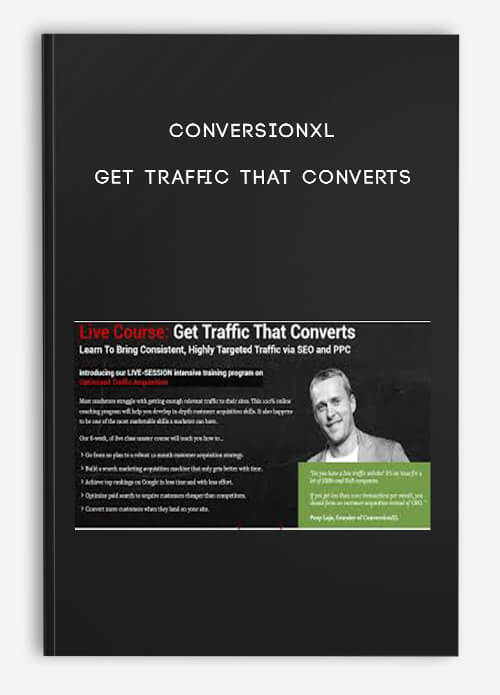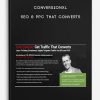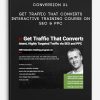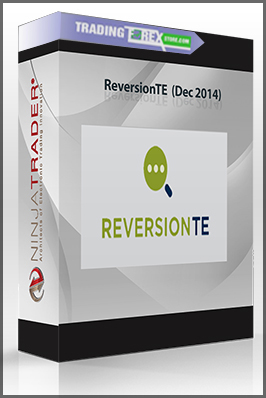ConversionXL – Get Traffic That Converts
$37.00
Product Include:
File size:
- Description
Description
ConversionXL – Get Traffic That Converts
**More information:
Get ConversionXL – Get Traffic That Converts at bestoftrader.com
Description
Live Course: Get Traffic That Converts
Learn To Bring Consistent, Highly Targeted Traffic via SEO and PPC
Introducing our LIVE-SESSION intensive training program on
Optimized Traffic Acquisition
Most marketers struggle with getting enough relevant traffic to their sites. This 100% online coaching program will help you develop in-depth customer acquisition skills. It also happens to be one of the most marketable skills a marketer can have.
Our 8-week, 16 live class master course will teach you how to.
Go from no plan to a robust 12-month customer acquisition strategy.
Build a search marketing acquisition machine that only gets better with time.
Achieve top rankings on Google in less time and with less effort.
Optimize paid search to acquire customers cheaper than competitors.
Convert more customers when they land on your site.
ConversionXL Institute brings you a live online training course led by SEO expert, Dan Shure, and PPC maven, Johnathan Dane.
Once you complete this course, you’ll be able to:
Take a customer acquisition strategy from “non-existent” to “fully-executed.”
Create the type of content that Google wants to rank (and users will love).
Conduct technical checks (beyond automated audit tools) to keep your site healthy and well tuned for SEO performance.
Clearly measure SEO success and ROI.
Earn backlinks to improve domain authority and rankings.
Actually convert the traffic you bring to your site (turn traffic into money).
Create a start-to-finish strategy that works for improving search rankings, traffic, and ultimately, conversions and revenue.
All in all, this course is going to make you a lot of money.
Course Curriculum
(Every class is 60 to 90 minutes, recorded, includes Q&A)
1 – Ranking Factors in 2017 and Beyond
SEO is constantly changing, yet many principles remain the same. This class will give you a solid footing to tackle search engine optimization now, as well as set you up with bulletproof rankings well into the future.
Class 2 – 10 Keyword Research Steps to Content Arbitrage
Keyword research is at the core of SEO strategy. Many think they know how to do it, but not many have a strategic process to consistently discover and rank for the top keywords. Learn how to discover a set of keywords you can actually rank for in this lesson.
Class 3 – How to Create Content That Ranks (and Keep it That Way)
You’ve put long, arduous hours into producing what you think is “great content,” but the traffic trickles in so slowly you wonder if it’s even worth it. Turns out, if you make some minor tweaks to your content strategy, you can drastically increase your SEO while expending the same amount of energy and time. Learn how to do that in this lesson.
More information about SEO Marketing – Traffic:
Search engine optimization (SEO) is the process of increasing the quality and quantity of website traffic by increasing the visibility of a website or a web page to users of a web search engine.
SEO refers to the improvement of unpaid results (known as “natural” or “organic” results) and excludes direct traffic/visitors and the purchase of paid placement.
SEO may target different kinds of searches, including image search, video search, academic search, news search, and industry-specific vertical search engines.
Optimizing a website may involve editing its content, adding content,
and modifying HTML and associated coding to both increase its relevance to specific keywords and remove barriers to the indexing activities of search engines like Google ,Yahoo etc.
[citation needed] Promoting a site to increase the number of backlinks, or inbound links, is another SEO tactic. By May 2015, mobile search had surpassed desktop search.[
As an Internet marketing strategy, SEO considers how search engines work, the computer-programmed algorithms that dictate search engine behavior,
what people search for, the actual search terms or keywords typed into search engines, and which search engines are preferred by their targeted audience.
SEO is performed because a website will receive more visitors from a search engine the higher the website ranks in the search engine results page (SERP).
These visitors can then be converted into customers.
SEO differs from local search engine optimization in that the latter is focused on optimizing a business’ online presence so that its web pages will be displayed by search engines
when a user enters a local search for its products or services. The former instead is more focused on national or international searches.















